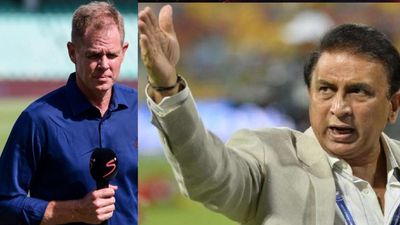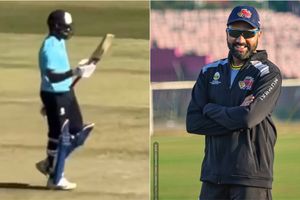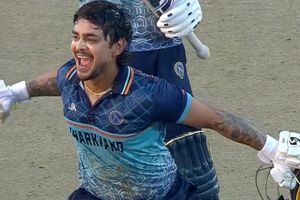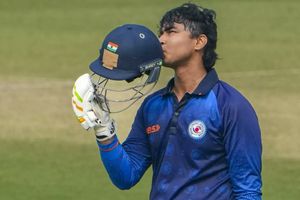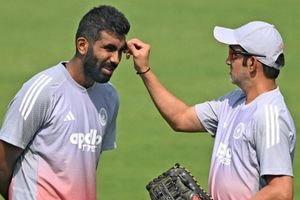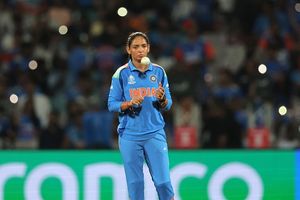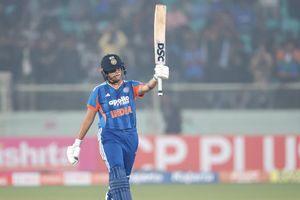South African batters were at the receiving end of the Indian bowlers' wrath in the first ODI where Aiden Markram's men suffered a humiliating eight-wicket defeat against KL Rahul's brigade on December 17, Sunday.
Despite having more regular white-ball players than India, who were missing key players like Virat Kohli, Rohit Sharma, Jasprit Bumrah, Mohammed Shami, and Ravindra Jadeja, South Africa's performance was below par. Winning the toss and choosing to bat, South Africa were bundled out for a paltry total of 116 runs in just 27.3 overs. It was Arshdeep Singh's robust yet maiden five-wicket haul and Avesh Khan's four-fer which caused South Africa's batting fiasco.
Follow the Sports Tak channel on WhatsApp
India almost claimed an early wicket with Arshdeep in the first ball but chose not to review against Reeza Hendricks. However, it didn't significantly impact the game, as Arshdeep quickly dismissed Hendricks and Rassie van der Dussen in successive deliveries, both without scoring. Tony de Zorzi and Heinrich Klaasen also fell victim to Arshdeep's bowling, leaving South Africa reeling early in the game.
Avesh then continued to dismantle the South African batting line-up. The highest score from the South African team came from Andile Phehlukwayo, who managed 33 runs off 49 balls. Arshdeep returned to dismiss Phehlukwayo, completing his five-wicket haul, before Kuldeep Yadav sealed South Africa's fate with the final wicket.
Disappointed with South African batting horror in the first ODI against India, bowling legend and former Protea skipper Shaun Pollock sharply criticised the team's approach. He questioned the rationale behind pursuing an aggressive style of play when losing wickets frequently. He labeled it as ‘nonsense’ and unacceptable, pointing out David Miller's recent example, who scored a century in the ODI World Cup but lost his wicket to an unnecessary cover drive, when he could have played more cautiously.
"Try and work their way out of the situation and get themselves into trouble and get bowled up very cheaply. And you can't do that. I mean, I can't accept that. The modern player will say, oh, you've got to be positive, all that nonsense. I can't accept that as a former South African, that always when you get put into pressure, you just fall down," Pollock told Star Sports, as quotes by Hindustan Times.
“For all honesty, what you could have been done there today is you could have just blocked out ten overs. You couldn't have scored a run for ten overs just to absorb some pressure and then you could have continued to bat and they would have posted 200 and something on the board. So, I mean, if you look at the class of...for example, David Miller, I mean, he walks to the crease, they're in trouble. He got a 100 in the World Cup semifinal in the same situation, but today he walks to the crease. He tries to execute a booming cover drive on the up and nicks off when his team needed him just to be there for a period of time,” Pollock continued.
"So I do get the point. We were old dinosaurs. We didn't play as positively as the modern player plays. But I'm afraid at some stage you have to take on that responsibility and say, I've got to dig in here today. Unfortunately, the best thing for the team is that I don't be positive and I actually just get myself in and get a decent runs," he further added.
Reacting to Pollock's critical comments, former Indian captain Sunil Gavaskar, who was on the same panel, offered an explanation for the approach that Pollock criticised. Gavaskar pointed out that the current trend in cricket, which Pollock finds problematic, arises from the abundance of choices available to modern players. He implied that today's cricketers have the opportunity to engage in various international T20 leagues worldwide, events that occur throughout the year.
“Back in my day, we didn’t have too many options. If we failed, we had to go back to club cricket. And there was no money in club cricket back then. Today, players have options. You play for your country, you play T20 leagues… you still can put the food on the table. And therefore there is this tendency to go bang-bang (with the bat)! (There is a tendency) If they don’t score runs, if they don’t take wickets, if they get dropped, so what? They will still have some T20 contract somewhere, if not with the IPL, then some league or the other. That makes players take a lot less responsibility. They try to take the easy way out, which is to go ‘bang-bang’. If they succeed, great. If they don’t, the team is 116 all out. So what? There will be another match two days later,” Gavaskar said.
India and South Africa will next lock horns with each other in the second ODI on December 19.
MORE ON SPORTS TAK:
ADVERTISEMENT
